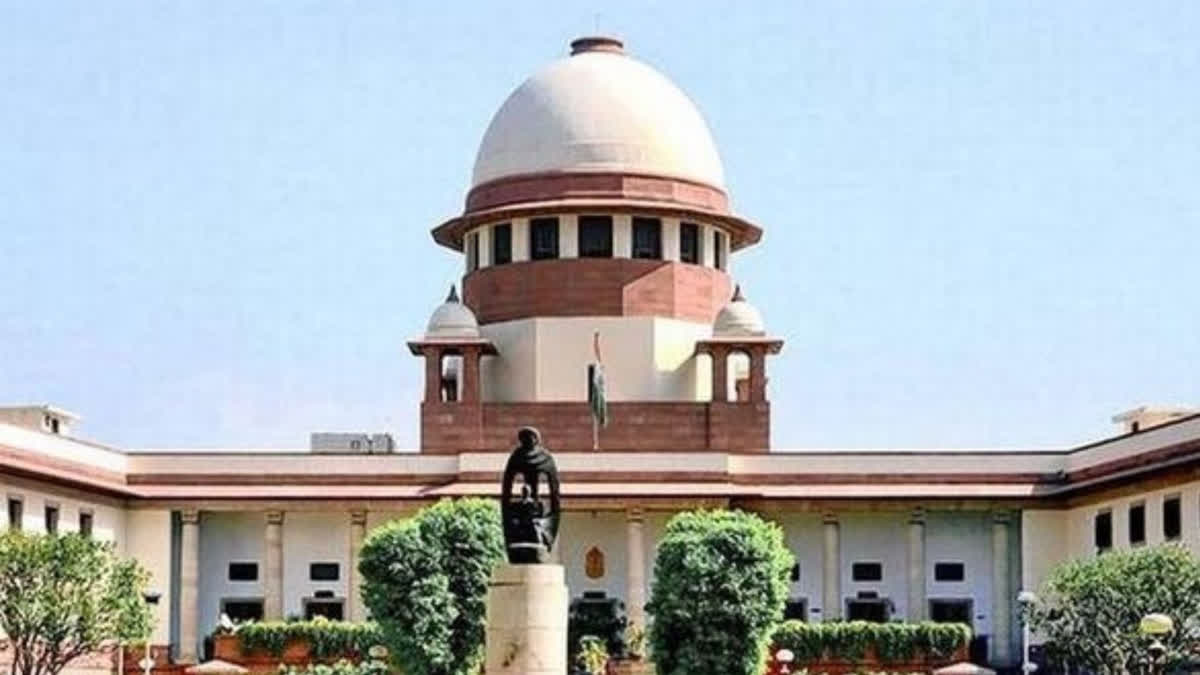New Delhi: The Supreme Court has issued a slew of guidelines for the courts in dealing with habeas corpus petitions or petitions for police protection.
The apex court said that the courts must acknowledge that some couples may face social stigma and while dealing with a petition for police protection by them on the grounds that they are same-sex, transgender, inter-faith or inter-caste couples, it must immediately grant police protection to the petitioners, before establishing the threshold requirement of being at grave risk of violence and abuse.
A bench led by Chief Justice of India D Y Chandrachud and comprising Justices J B Pardiwala and Manoj Misra said: “Courts must bear in mind that the concept of ‘family’ is not limited to natal family but also encompasses a person's chosen family. This is true for all persons. However, it has gained heightened significance for LGBTQ+ persons on account of the violence and lack of safety that they may experience at the hands of their natal family”.
The bench said ascertaining the wishes of a person is one thing but it would be completely inappropriate to attempt to overcome the identity and sexual orientation of an individual by a process of purported counselling. Judges must eschew the tendency to substitute their own subjective values for the values which are protected by the Constitution, it added.
The apex court made these observations while declining to entertain a petition by a Kerala woman who claimed that her same-sex partner was illegally confined by her family. The petition seeking a writ of habeas corpus was instituted on the ground that the ‘X’ was being forcibly kept by her parents in their custody whereas she wished to remain with the appellant. The apex court pronounced the judgment on March 11, but it was uploaded today.
The bench issued a slew of guidelines for the courts in dealing with habeas corpus petitions or petitions for police protection. “In evaluating the locus standi of a partner or friend, the court must not make a roving enquiry into the precise nature of the relationship between the appellant and the person; The effort must be to create an environment conducive for a free and uncoerced dialogue to ascertain the wishes of the corpus”, said the CJI, who authored the judgment on behalf of the bench.
The CJI said the court must ensure that the wishes of the detained person is not unduly influenced by the court, or the police, or the natal family during the course of the proceedings. The CJI said the court must ensure that the individuals(s) alleged to be detaining the individual against their volition are not present in the same environment as the detained or missing person. Similarly, in petitions seeking police protection from the natal family of the parties, the family must not be placed in the same environment as the petitioners, said the bench.
The CJI said the judges must showcase sincere empathy and compassion for the case of the detained or missing person and social morality laden with homophobic or transphobic views or any personal predilection of the judge or sympathy for the natal family must be eschewed. The court must ensure that the law is followed in ascertaining the free will of the detained or missing person, it added.
The CJI said that the court must acknowledge that some intimate partners may face social stigma and a neutral stand of the law would be detrimental to the fundamental freedoms of the appellant. “Therefore, a court while dealing with a petition for police protection by intimate partners on the grounds that they are a same sex, transgender, inter-faith or inter-caste couple must grant an ad-interim measure, such as immediately granting police protection to the petitioners, before establishing the threshold requirement of being at grave risk of violence and abuse. The protection granted to intimate partners must be with a view to maintain their privacy and dignity”, said the CJI.
The CJI stressed that the role of the court is limited to ascertaining the will of the person and the court must not adopt counselling as a means of changing the mind of the appellant, or the detained/missing person.
“The Judge during the interaction with the corpus to ascertain their views must not attempt to change or influence the admission of the sexual orientation or gender identity of the appellant or the corpus. The court must act swiftly against any queerphobic, transphobic, or otherwise derogatory conduct or remark by the alleged detainers, court staff, or lawyers”, said the CJI.
“Sexual orientation and gender identity fall in a core zone of privacy of an individual. These identities are a matter of self-identification and no stigma or moral judgment must be imposed when dealing with cases involving parties from the LGBTQ+ community. Courts must exercise caution in passing any direction or making any comment which may be perceived as pejorative”, said the CJI, adding that these guidelines must be followed in letter and spirit as a mandatory minimum measure to secure the fundamental rights and dignity of intimate partners, and members of the LGBTQ+ communities in illegal detention.
In February last year, the apex court had stayed further proceedings before the Kerala high court and directed a senior judicial officer to interact with the detenu to ascertain her wishes on whether she was voluntarily residing with her parents or was under illegal detention.
The court had deputed a judicial officer to meet the woman who was allegedly confined and interview her at a family court in Kollam. The report, submitted by the officer, said the petitioner was the woman’s “intimate friend”, but the woman did not want to get married or settle down with any person.


